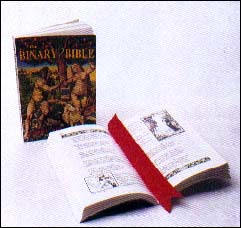Review
The Binary Bible
by Marta Deike
START Editorial Assistant
$aint Silicon has emerged from Silicon Valley to bring divine answers to questions that computer enthusiasts have probably never thought to ask--questions like "What is the meaning of our hard drives?" And, "Why must we suffer inevitable bugs?"
The answers to these and other questions are found not on a scroll, nor even on a scrolling screen. Instead, they're contained in The Binary Bible by Jeffrey Armstrong, a.k.a. $aint Silicon. Based on the title, this would seem to be the be-all and end-all of computer humor. That's a pretty tall order, but any book with "Bible" in the name is bound to raise my expectations. Lightning (or Disk I/O) will surely strike me dead for saying this, but I just didn't find it consistently funny.
In the Beginning
 |
The Binary Bible is just a bit too tedi- ous for straight- through reading, but it does have oc- casional moments of real satiric humor. It's at its best in a parody of contem- porary evangelists. |
The Binary Bible begins with a parody of Genesis: "And the Giver of Data said, Let there be Electricity: and there was Electricity." In "Sysgen," G.O.D. is a Graphics Omniscient Device with Oddem and Even skipping across the Griden of Readin. (Read that one aloud.) The devil is a glitch who tempted Even with the Apple and that's why, to this day, our programs are never entirely bug-free.
And there you have it. For the most part, all of the mysteries of the ancient computer world--and the entire premise of the book--are contained in these first three chapters. What happens in the remaining 150 pages? Oh, that you should ask.
After Sysgen, the Binary Bible appears headed as a satire of the real Bible, which is what I'd had high hopes for. But except for a few occasional parables like the "Sermon on the Monitor," Sysgen and Revelation are the only two portions that maintain the Biblical parallel. And Revelation seems out of place in the book.
Revelations
Revelation does, in fact, resemble the Revelation of St. John of the Cross in its focus on the future. Armstrong's version is a pious sermon on love that encourages us to interact with human beings, not just with our terminals. Actually, Armstrong is rather endearing here, but the sudden sincerity is totally incongruous with the tongue-in-cheek tone of the rest of the book.
Much of the rest of the Binary Bible consists of hymns, prayers and poems, all in computerese. Indeed, and this is my complaint, most of the book seems to be merely a vehicle for strained puns based on computer jargon. Eventually, the Biblical theme is foresaken altogether and all kinds of little spoofs pop up in its place. Armstrong shifts to Nursery Rhymes ("Mother Gauss") and Astrology with signs like "Arrays," "Virtual" and, my personal favorite, "PCs."
Have You Been D-Based?
This is not to say that the Binary Bible doesn't have some redeeming qualities. There are moments of real satiric humor. My favorite section is halfway into the book, where Armstrong launches into a parody of contemporary evangelists. As $aint Silicon, he promotes C.H.I.P (the Church of Heuristic Information Processing), complete with its own Byte University. "Have you been D-Based and D-filed?" he asks. "Do you suffer from Information indigestion? Then you need C.H.I.P," the world's first "user-friendly" religion. There's even a list of handy catch-phrases in case you want to become a true DOSciple. It is here that the book is at its best.
Unfortunately, the Binary Bible is merely a compilation of puns, rather than an incisive satire. It is definitely not a book to be read straight through. Taken in small doses, however, it might be good for a smile (like just after your hard drive crashes). But for $14.95, I'd recommend waiting for the movie.
PRODUCTS MENTIONED
The Binary Bible, $14.95. Winchester Cathoderal, 1803 Mission Street #174 Santa Cruz, CA 95060 (408) 458-0213.